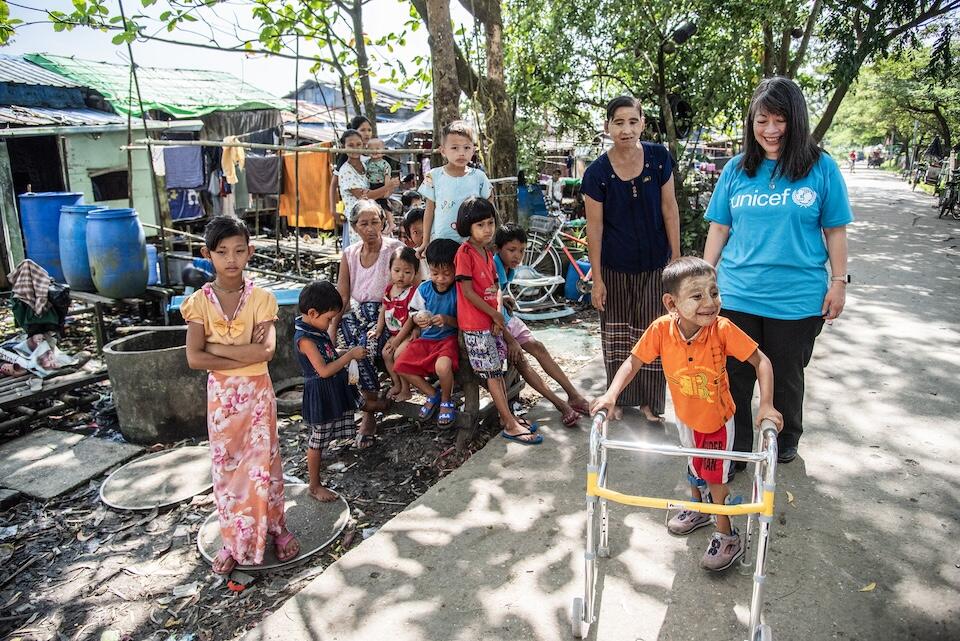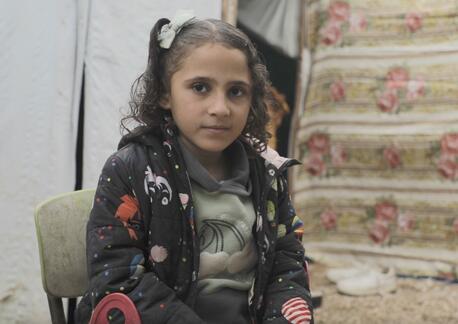Children, Families at Risk in Myanmar Need Urgent Assistance
Myanmar's humanitarian crisis, fueled by escalating conflict and climate shocks, is reaching a critical inflection point. UNICEF is there, making a difference for children and families facing grave risks, but more support is urgently needed.
Mounting threats to children's health and safety in Myanmar
Rising levels of violence, large-scale displacement and a devastating typhoon have compounded the humanitarian needs of children and families in Myanmar, prompting UNICEF to call on the international community to step up its support to prevent further suffering.
"The humanitarian crisis in Myanmar is reaching a critical inflection point, with escalating conflict and climate shocks putting children and families at unprecedented risk," UNICEF Deputy Executive Director Ted Chaiban said after a visit to the country in mid-November.
Over 3.4 million people in Myanmar are displaced, nearly 40 percent of them children, Chaiban noted.
"During my visit to conflict-affected areas, I witnessed firsthand the devastating impact on children, exacerbated by ongoing violence and severe climate events such as Typhoon Yagi," he said. "The stories I heard from families were heartbreaking — children cut off from vital services, including health care and education, and suffering from the effects of violence and displacement."
Yagi was one of the strongest typhoons to hit Southeast Asia in decades. The mid-September storm caused severe flooding that affected over 1 million people across 70 of Myanmar's townships, including 300,000 children.
UNICEF's ongoing emergency response includes providing essential WASH (water, sanitation and hygiene) supplies to more than 530,000 people affected by conflict, floods and acute watery diarrhea. Close to 67,000 people received primary health care services with UNICEF support.
Emergency response measures are also ongoing in Vietnam, Laos and Thailand. Learn more about UNICEF's regional response to Typhoon Yagi and how to help.
An urgent need to protect children in Myanmar from grave child rights violations
As climate emergencies compound humanitarian needs, the impact of ongoing violence on children continues to escalate as well. On Nov. 15, 2024, an airstrike hit a Kachin church compound where children were playing football, killing seven children and two other civilians.
"I visited Kachin and saw firsthand how vulnerable children and other civilians are in conflict-affected areas and the urgent need to uphold international humanitarian law to protect them from such brutal attacks," Chaiban said.
Since the beginning of 2024, at least 650 children in Myanmar have been killed or maimed in violence. Children also represent one-third of the over 1,000 civilian casualties from landmines and explosive remnants of war.
"The increasing use of deadly weapons in civilian areas, including air strikes and landmines hitting homes, hospitals and schools, has severely restricted the already limited safe spaces for children, robbing them of their right to safety and security," Chaiban said. "The situation is dire."
The increasing use of deadly weapons in civilian areas, including air strikes and landmines hitting homes, hospitals, and schools, has severely restricted the already limited safe spaces for children, robbing them of their right to safety and security. The situation is dire. — UNICEF Deputy Executive Director Ted Chaiban
Chaiban said he met with parties to the conflict to stress the need for all to guarantee safe and unhindered aid, and to do what is necessary to protect children from grave violations of their rights.
"International humanitarian law must be upheld, with a focus on protecting civilians and civilian infrastructure — including schools and hospitals — and ensuring safe passage for those fleeing from violence," Chaiban said.
Humanitarian access remains constrained by ongoing armed conflict, insecurity, bureaucratic impediments and lack of telecommunications and personal protective equipment.
UNICEF and partners are reaching children in need, including in front line and hard-to-reach areas, with lifesaving services despite these significant challenges — but critically low funding is a major issue. Less than one-quarter of UNICEF's humanitarian appeal for Myanmar for 2024 has been met. (Read the latest Situation Report for details.)
"UNICEF’s commitment to uphold the rights of children remains firm," Chaiban said. "We urge all parties to the conflict to prioritize the protection of children and ensure safe, timely and unhindered humanitarian access. UNICEF will continue to highlight the increasing needs of children, and call for stronger international engagement to support them and their families. We urgently call on the international community to step up its support — through funding, advocacy and solidarity — to prevent further suffering.
"The cost of inaction is far too high. Myanmar’s children cannot afford to wait."

Learn more about what UNICEF is doing in Myanmar to support and protect vulnerable children.
UNICEF works in over 190 countries and territories to create a more equitable world for children. Support UNICEF's mission. Donate today.
HOW TO HELP
There are many ways to make a difference
War, famine, poverty, natural disasters — threats to the world's children keep coming. But UNICEF won't stop working to keep children healthy and safe.
UNICEF works in over 190 countries and territories — more places than any other children's organization. UNICEF has the world's largest humanitarian warehouse and, when disaster strikes, can get supplies almost anywhere within 72 hours. Constantly innovating, always advocating for a better world for children, UNICEF works to ensure that every child can grow up healthy, educated, protected and respected.
Would you like to help give all children the opportunity to reach their full potential? There are many ways to get involved.





